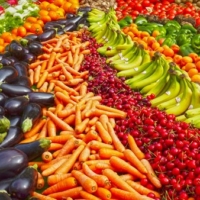For many years, the interest on carotenoids as food constituents resided in the colour they impart and the fact that some of them are precursors of vitamin A. Carotenoids are pigments responsible for bright red, yellow and orange hues in many fruits and vegetables although they are also very abundant in green vegetables, where they are masked by chlorophylls. To date, over 750 have been described in plants, algae, animals, fungi, and a wide variety of prokaryotic microorganisms. (1)
Carotenoids are very versatile compounds that play key roles in Nature. Their presence in foods is important not only for their role in food acceptability as colorants but also because they can promote health.
VIDEO 1 Carotenoids: Key compounds in Nature.
These extraordinary compounds are among the most ancient in life history. Their structures and actions have evolved over millions of years. Carotenoids and their derivatives are key in essential processes including photosynthesis i.e., the engine of life on Earth, plant development, pollination, seed dispersal, animal mating and many others. Taken together it is inarguable that they are of great importance for food production.
Evidence has accumulated that their presence in the diet at adequate levels is associated with a lower risk of developing diverse diseases such as cancer, eye and skin conditions, metabolic disorders, among others.
Recent studies indicate that they could be beneficial towards the reduction of risk of cardiometabolic diseases, one of the leading causes of death that has been estimated to cost around 192 billion € per year to Europeans.
Being essential in photosynthesis, pollination, seed dispersal and precursors of plant hormones and signals it is unarguable that carotenoids are key for plant survival, development, and propagation and therefore in the production of foods and feeds.
Learning more about their roles in plants but also in algae or even microbes will be important to produce foods more efficiently and contribute to sustainability.
Considering versatility and the importance of carotenoids in the nature, the COST Action EUROCAROTEN was conceived to coordinate synergistic transdisciplinary research towards the sustainable production of health-promoting foods.
Despite the diverse carotenoids presently known, only a few have or are being studied in- depth. In addition, most carotenoid derivatives are basically unknown. Therefore, there is intense interest and great potential for the discovery of “new” carotenoids or derivatives as well as novel sources.
In this sense, launched in 2016, EUROCAROTEN COST Action, which stands for European network to advance carotenoid research and applications in agro-food and health, has implemented a network for the advancement of carotenoids research and applications in agro-food and health.
The network gathered a multidisciplinary European network of researchers from 35 countries bringing together scientists with microbiology, chemistry, food science, food technology, nutrition, biotechnology, plant science, agriculture, pharmacology, toxicology, and medical expertise. The objective is to explore the great possibilities carotenoids ubiquity, and their versatility can offer to achieve breakthroughs and innovations at scientific, technological, and socioeconomic levels.
The Action has produced the most cited article published since 2018 in Progress in Lipid Research, the top ranked journal in the Nutrition and Dietetic and has already received nearly 200 citations, which is highly indicating general interest for carotenoid research and its timeliness.
The article reviews the biosynthesis of carotenoids in diverse organisms, their importance in agro-food and health and outlines further research needs. The agro-food industry is the second largest economic sector in the EU. It employs around 50 million people, and it is worth around €750 billion a year in Europe.
Research on carotenoids is crucial to solve the global challenge of producing health-promoting sustainable foods. Today the network is mature, strong, and cohesive and contributes to create wealth, improve health and reduce costs related to serious diseases.
“Carotenoids are extraordinary compounds that serve to illustrate the magic and wisdom of Nature, which has learnt to harness this ancient compound for the most diverse purposes, including making our diets healthier and more appealing”, says Prof. Antonio J. Meléndez Martínez, the COST Action Chair.
Additional information:
A global perspective on carotenoids: Metabolism, biotechnology, and benefits for nutrition and health. Progress in Lipid Research 70, 62-93.
Carotenoids and derivatives: importance in food security and applications: watch the video
- Prokaryotic microorganisms: unicellular organism lacking a distinct nucleus and membrane-bound organelles.
